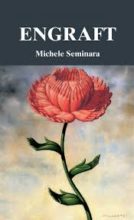Anna Couani reviews Engraft by Michele Seminara
 Engraft
Engraft
by Michele Seminara
Reviewed by ANNA COUANI
Not so long ago, publishing a first book of poetry was akin to dropping a pebble into a bottomless well. Today, although the poetry scene is a confined one, Engraft by Michele Seminara finds itself in a much more vibrant situation. After only a few months, the book has been launched four times in Sydney, Melbourne and Newcastle and has been widely publicised in social media. Engraft was launched by Martin Langford in Sydney, Saba Vasefi at the International Women Writers Festival in Parliament House in Sydney and by Anne Walsh in Newcastle. The people at Island Press, all from the old Poets Union days, all volunteer labour, as well as other collaborators in Michele’s literary network, should be commended for their level of organisation and promotion, usually something peculiar to the major presses.
Because of online publishing and commentary and the democratising effect of it, it’s so much easier now for a writer to be embedded in the literary scene and become a voice within it rather than having to wait on gatekeepers to allow admission. The embeddedness of this book is partly due to the fact that Michele, as a mature person entering the literary scene, has quickly moved into editing and publishing, working with Verity La and publishing reviews in online journals such as Mascara. And she is able to sell her book from her own blog, a testimony to the loosening of the publisher’s reins, maybe only possible in the small press context where the author is more empowered.
Michele’s maturity and life experiences inform the poetry and are crucial to it. The cover of the book, an image of a flower made of petals with multiple uplifted hands like a supplicant, belies the work within it. Not the work of a supplicant, but of someone who has entered the literary scene and gotten down to business. This approach is evident in her poem Slip where she exhorts:
Oh be still, Ruth, I admonish, and do not lie
at the master’s feet — but rise
from your fate and know that you are God!
If you were asked — to turn that corner,
walk into that room, say yes
to that dance — would you?
Or would you answer
(quickly, so as not to wake the unborn) — No!
Then watch in awe as this life slips away.
The title Engraft is an appropriate one for the collection. It suggests the mature perspective of a writer who understands the conundrum of originality and how we’re all writing inside a set of conventions. But it also refers explicitly to the fact that some of the poems are hybrid. Some are found and remix poems from the texts of other writers, mostly iconic writers of the past like Kafka, Dickinson, Shakespeare, Lowell, Plath, Joyce, Duras. In some cases, the language Michele uses mimics the slightly archaic language and conventions of some of those writers. In a sense, this process matches the emotional intensity that Michele injects into her work, departs from the prosaic, the deadpan. In Engraft, she rewrites Shakespeare’s sonnet 15:
Man is conceived upon this sullied stage
and like a seedling grows, but then decreases.
He vaunts his youthful sap in brave conceit,
till wasteful time decays his day to night.
Everything holds but a little moment –
even your perfection cannot stay.
So I’ll make war with time and as he takes you,
make love, and with my pen engraft you new.
The subject matter of the poems often seems intensely personal and autobiographical but then it’s not quite clear whether that’s because she’s assembling lines from other writers, finding equivalents to her own experience in their work, or simply writing in a high emotional key about her own experience. There is substantial inflected affect throughout the work and a mood of excitement and enthusiasm. There are a number of poems about writing and the need to write. In the poem, Dog, the writer compares herself to a dog driven to sniff in the long green strands/of its siren-muse,/burrowing to inhale/the prized and pungent self. She cleverly alternates between being pulled into writing like a sniffing dog but then also being jerked back out of it:
World jerks my neck, master to
slave, and drags me
from word’s wonderment
There are allusions to highly dramatic events and interactions, drawing the reader into a seemingly autobiographical disrupted narrative of some sort. The work is tantalising but you’re left thirsting for facts of the writer’s life, curious to know what all those dramas are, that are suggested but not made explicit.
ANNA COUANI is a Sydney poet, teacher and visual artist. She a was involved in small press publishing and writers’ groups from 1975 till 1992. Her most recent chapbook is Small Wonders (Flying Islands Books, Macao, 2012). She currently runs an art gallery in Glebe, Sydney.